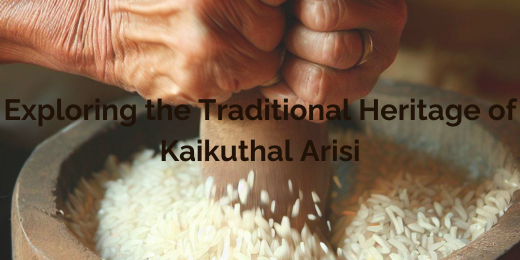
Exploring the Traditional Heritage of Kaikuthal Arisi
Introduction to Kaikuthal Arisi: Unveiling the Historical Significance
Kaikuthal Arisi, also known as Hand-Pounded Rice, holds a rich historical significance that transcends time. Originating from ancient Tamil Nadu in South India, this traditional method of rice processing has been cherished for centuries. The benefits of Kaikuthal Arisi lie in its unique preparation technique, where the rice is manually pounded using a large mortar and pestle, preserving the nutrient content and natural aroma.
This labor-intensive process results in a distinctive grain texture and enhanced digestibility, making it easier on the stomach. Moreover, Kaikuthal Arisi is a valuable source of essential vitamins, minerals, and dietary fiber, promoting overall well-being. Embracing this ancient grain not only nourishes our bodies but also preserves a piece of our cultural heritage. Similarly, the benefits of traditional rice extend beyond its rich cultural heritage; these heritage grains also offer enhanced flavor and nutritional value, making them a wholesome choice for health-conscious individuals.
Cultural Significance of Kaikuthal Arisi: Traditional Practices and Beliefs
Kaikuthal Arisi carries a profound cultural significance deeply rooted in traditional practices and beliefs. In many regions of South India, this time-honored method of rice processing is regarded as an integral part of local heritage. The benefits of Kaikuthal Arisi extend beyond its nutritional value; it represents a way of life, connecting people to their ancestral roots and preserving age-old customs.
The meticulous process of hand-pounding rice reflects the importance placed on patience, craftsmanship, and community collaboration. Furthermore, Kaikuthal Arisi is often associated with auspicious occasions and religious rituals, symbolizing abundance, purity, and blessings. Embracing this traditional grain not only nourishes the body but also fosters a sense of cultural identity and reverence for ancestral traditions. The benefits of Mappillai Samba rice go beyond its cultural heritage, offering enhanced flavor and nutritional value, making it a wholesome choice for health-conscious individuals.
Nutritional Value of Kaikuthal Arisi: Health Benefits and Unique Characteristics
Kaikuthal Arisi, or Hand-Pounded Rice, not only carries cultural significance but also offers remarkable health benefits and unique characteristics in terms of its nutritional value. This traditional rice variety, prepared through the labor-intensive method of manual pounding, retains its natural nutrients, making it a wholesome choice for those seeking a nutrient-rich diet.
Kaikuthal Arisi is a good source of dietary fiber, essential vitamins, and minerals, such as iron and magnesium. Its distinctive grain texture and gentle processing make it easier to digest, making it suitable for individuals with digestive sensitivities. Additionally, the hand-pounding technique helps preserve the rice’s natural aroma, enhancing the overall sensory experience of the meal. Incorporating Kaikuthal Arisi into one’s diet not only contributes to better nutrition but also promotes a deeper connection with traditional food practices. Likewise, the benefits of Kattuyanam rice include its exceptional nutritional value and unique flavor, making it a preferred choice for those who value both taste and health in their meals.
Traditional Recipes with Kaikuthal Arisi: Gastronomic Delights Passed Down Through Generations
Kaikuthal Arisi serves as the foundation for a myriad of traditional recipes that have been passed down through generations, delighting gastronomes with their exquisite flavors and cultural significance. The benefits of Kaikuthal Arisi extend beyond its nutritional value, as it adds a distinct texture and aroma to various dishes. From classic biryanis to wholesome porridges and delectable sweets, this ancient grain lends itself to a wide range of culinary creations.
The unique hand-pounding process ensures that the rice retains its natural goodness, making it the preferred choice for those seeking both taste and health benefits. Embracing these traditional recipes not only nourishes the body but also connects us to our cultural heritage, allowing us to savor the flavors of the past while creating new memories for the future.
Conservation Efforts: Preserving the Traditional Heritage of Kaikuthal Arisi
In an era where modernization and convenience dominate our food choices, conservation efforts play a vital role in preserving the traditional heritage of Kaikuthal Arisi, or Hand-Pounded Rice. Recognizing the cultural significance and nutritional benefits of this ancient grain, initiatives have emerged to safeguard its legacy. These efforts encompass various aspects, including promoting sustainable farming practices, supporting local farmers, and creating awareness about the unique qualities of Kaikuthal Arisi.
By highlighting the historical importance of this traditional rice variety and encouraging its consumption, conservationists aim to ensure that future generations can enjoy the authentic flavors, health benefits, and cultural identity associated with Kaikuthal Arisi. Through these endeavours, we not only safeguard a valuable piece of our culinary heritage but also foster a deeper appreciation for the traditional practices that have sustained us for centuries.
Embracing Kaikuthal Arisi: Promoting Awareness and Sustainability for Future Generations
Embracing Kaikuthal Arisi, or Hand-Pounded Rice, goes beyond enjoying its culinary delights; it involves promoting awareness and sustainability for the benefit of future generations. By understanding the numerous benefits of Kaikuthal Arisi, such as its rich nutritional value and cultural significance, we can create a ripple effect of appreciation and support. Raising awareness about this traditional grain helps preserve its heritage, ensuring that it continues to thrive in a rapidly changing world.
Additionally, advocating for sustainable farming practices and supporting local farmers cultivates a sense of responsibility towards the environment and the communities that have upheld this age-old tradition. By embracing Kaikuthal Arisi, we not only nourish ourselves but also contribute to a more sustainable and culturally diverse future.